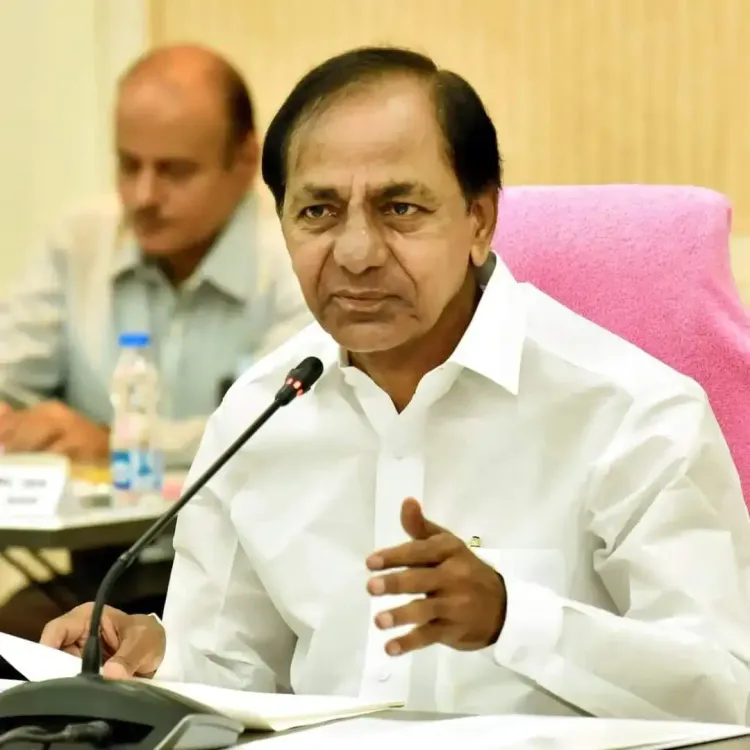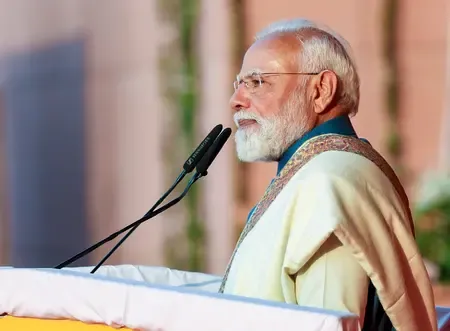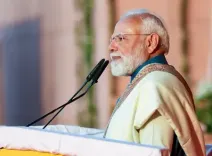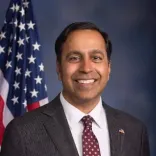Is KCR Directly Responsible for Kaleshwaram Project Irregularities?

Synopsis
Key Takeaways
- KCR is held directly accountable for project irregularities.
- Key officials and contractors are implicated in mismanagement.
- The report calls for enhanced accountability in public projects.
- Significant governance questions arise from the findings.
- Future oversight and evaluations are necessary to prevent similar issues.
Hyderabad, Aug 4 (NationPress) The P.C. Ghose Commission has determined that former Chief Minister K. Chandrasekhar Rao (KCR) is directly and vicariously responsible for irregularities in the planning, execution, completion, operation, and maintenance of the vital Kaleshwaram Lift Irrigation Project in Telangana.
Additionally, KCR is accountable for price adjustments, contract modifications, and financial guarantees, according to a summary compiled by a panel of officials following a review of the report.
The commission, led by former Supreme Court judge Pinaki Chandra Ghose, submitted its findings to the Telangana government on July 31.
On August 1, the government established a committee to thoroughly analyze the report and create a detailed summary, which is set to be discussed in the state Cabinet meeting later today.
The Commission investigated the alleged discrepancies in the planning, design, construction, quality control, operation, and maintenance of the Medigadda, Annaram, and Sundilla Barrages within the Kaleshwaram project.
It has specifically identified a number of individuals and institutional officials—engineers and political executives—who are accountable for the failures of the Medigadda, Annaram, and Sundilla barrages.
The Commission revealed that the then Minister for Finance and Planning Eatala Rajender denied financial responsibility, deferring all accountability to the Kaleshwaram Irrigation Project Corporation Limited (KIPCL), despite the Finance Department's presence on the KIPCL Board.
Reports indicate that the former Minister for Irrigation issued arbitrary instructions without accountability, undermining the administrative process.
Furthermore, it was found that IAS officer S.K. Joshi, who served as Principal Secretary for irrigation, suppressed a crucial expert committee report that could have prevented the construction of the Medigadda barrage.
The commission noted that IAS officer Smitha Sabharwal, who was then Additional Secretary to the CM, failed to present essential documents before the Cabinet and breached business regulations.
Members of the KIPCL Board, both past and present, have been held accountable for acting as loan facilitators without oversight, misappropriating public funds, and neglecting project evaluations and revenue generation duties.
Officials from the Finance and Irrigation departments on the KIPCL Board are deemed liable for criminal breach of trust and misappropriation, according to the Commission.
Regarding contractors, it stated that L&T (Medigadda) is not entitled to any certificates and must finish restoring the 7th block and correcting defects at its own expense.
Agencies responsible for Annaram and Sundilla are liable for defect corrections during the Defect Liability Period (DLP) at their cost.
The Chief Engineer of the Central Designs Organisation (CDO), along with Engineers and Chief Engineers of the Telangana State Engineering Research Laboratories (TSERL), the Engineer-in-Chief of the Kaleshwaram Project, Superintending Engineers, Executive Engineers, Deputy Executive Engineers, and Assistant Engineers have been held responsible for design flaws without model studies, subpar construction quality, lack of third-party evaluations, and ineffective operation and maintenance.
On Quality Control and Certification irregularities, it observed that Executive Engineers and Superintending Engineers issued a Substantial Completion Certificate (Medigadda, September 9, 2019) and Certificate of Completion (Medigadda March 15, 2021). They are now held accountable for wrongful and illegal certifications favoring contractors.
Quality control engineers for Annaram and Sundilla have been deemed liable for overlooking defects/leakages at the time of certification.
The Engineer-in-Chief (O&M) and the Dam Safety Division have been held accountable for a complete failure in operational and maintenance activities.
The report specifically calls out C. Muralidhar, Engineer-in-Chief (Irrigation) and B. Hari Ram, Chief Engineer, PCSS Project. They are responsible for suppressing crucial facts regarding the nature of contracts (lump sum vs turnkey), misleading the CWC, and ignoring expert committee reports.
A. Narender Reddy, T. Srinivas, and Omkar Singh have been found liable for false testimony before the Commission.
This one-man Commission was established on March 14, 2024, to investigate the allegations.
Over the past 15 months, the Ghose Commission has interviewed more than 115 witnesses, including engineers and both retired and current officials linked to the barrages and others.
Some piers of the Medigadda Barrage collapsed in October 2023.
After the Congress party assumed power in December 2024, they ordered a probe by the Vigilance Department.
The National Dam Safety Authority (NDSA) was also tasked with investigating all facets of the mega project.
Following preliminary findings from the Vigilance Department that indicated irregularities, Chief Minister Revanth Reddy announced a judicial inquiry during an Assembly debate.
The Commission's term has been extended seven times since its initial term ended on June 30, 2024, with the latest extension granted until July 31.
After the last extension, the Commission summoned KCR and former ministers T. Harish Rao and Eatala Rajender.
KCR appeared before the Commission on June 11. The BRS leader, who served as chief minister from 2014 to 2023, was reportedly questioned about the project's redesign and the policy and financial decisions made for its construction.
The BRS has denied any allegations of corruption related to the Kaleshwaram project, labeling the summons to KCR as a politically motivated act by the government.










